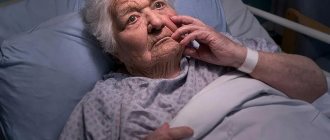Medical information is reliable Checked by Shaidullin Renat Flyurovich
Schizophrenia is a mental disorder characterized by disturbances in the emotional-volitional sphere and pathology of thought processes. Officially included in the international classification of diseases ICD-10 under the label F-20. It affects people regardless of age, gender and social status. In men it appears at an earlier age (18-25 years), while in women it first develops between 26 and 45 years.
During periods of exacerbation, a sick person must be under the supervision of a specialist. In this case, he will be provided with assistance to overcome the crisis in the most delicate manner. We provide anonymous support and keep the information of the patient and his relatives confidential.
Signs of schizophrenia
Official medicine finds it difficult to determine the exact causes that cause the development of schizophrenia. Long-term study of the mechanisms of the disease has not made it possible to identify specific stimuli for the deterioration of mental health. Somatic manifestations of the disease in childhood, adulthood and adolescence have significant differences. Therefore, a final diagnosis is possible only during the onset of puberty.
Among the most likely prerequisites for the development of a mental disorder, there are several main ones.
- Genetic predisposition.
The disease can be inherited from a close relative; approximately 10% of children in adolescence are diagnosed with this diagnosis if their mother or father has it.
- Hormonal dysfunction.
Schizophrenia is associated with impaired dopamine production. This hormone is a neurotransmitter that is responsible for the state of a person’s emotional sphere. If there is a pathology of the central nervous system, dopamine is produced in excess. At the physiological level, this causes intense mental overexcitation, in which a person constantly remains. The result is delusions, paranoid ideas, obsession, psychosis or hallucinations.
- The impact of viruses on the human body.
There is a category of pathogenic microorganisms that can destroy nerve cells. One of the most known pathological agents to science is the herpes virus. With good immunity, it can stay in the body for years without causing harm. If the patient suffers from various diseases of a chronic or infectious nature, viruses can manifest themselves, causing the manifestation of schizophrenia.
- Toxoplasmosis.
This is an indirect cause of the development of schizophrenia, but rather one of the risk factors. It is especially dangerous if a pregnant woman is infected: the fetus can develop pathologies, including diseases of the nervous system.
Common causes of schizophrenia include:
- alcohol, drug and other types of addiction;
- pathologies of intrauterine development;
- brain injuries that occurred during childbirth or throughout life;
- heredity;
- severe emotional shock;
- prolonged stay in a state of stress, prolonged depression.
Scientists believe that specific family attitudes are also the trigger for the development of the disease. Parents force the child to react to certain situations according to one scenario, while they themselves perform completely different actions. The dualistic attitude cannot be analyzed by a small child due to his age. Contradictions grow inside him, with which he is left alone. The constant search for answers to one's questions causes intrapersonal conflict, which over time can develop into a mental disorder.
Age limits
There is another important point that distinguishes male schizophrenia from female schizophrenia. The latter appears somewhat later and develops more slowly. Moreover, it is not always possible to immediately distinguish it from ordinary tantrums and mood swings, which are also more often attributed to women based on the same cultural stereotypes.
According to statistics, the peak incidence of schizophrenia in men occurs at the age of 16-35 years. For women, this range is from 28 to 37 years. At the same time, initial signs in boys can appear as early as 2-4 years. This is expressed in the child’s excessive isolation. At this age he should be active and inquisitive. If he does not communicate with peers and even relatives, then it is better to show him to a psychologist, even if there is no risk of schizophrenia.
Singles are 4 times more likely to suffer from schizophrenia than married people.
But often schizophrenia in men starts in adolescence or young adulthood. If we are talking about the hebephrenic form, then it can appear at 12-14 years old, simple - at 14-20, and paranoid - at 25.
The earlier it manifested, the more severe it will be. The problem is that changes in the patient’s behavior are not always perceived by relatives as pathological. Usually they justify their loved one with difficult age, bad company, alcohol and other factors.
Prerequisites for the development of schizophrenia in childhood
The psyche of a small child is very vulnerable; his condition and mood largely depend on the people around him and the events taking place around him. The psychological perception of reality is established at an early age. If a deviation of the schizoid type is observed, doctors do not undertake to make a definitive diagnosis; they recommend waiting until adolescence.
The tendency to the disease in preschool age manifests itself specifically:
- the child is considered strange - he reacts inappropriately to events;
- often experiences unreasonable fear;
- becomes overly irritable and impulsive;
- when observing him, increased nervous excitability appears;
- bouts of crying that occur for no particular reason can last a long time;
- the child often moves from euphoria to apathy;
- he talks about his visions, hallucinations;
- the teenager is bothered by obsessive thoughts, he gets fixated on the same idea.
If there are several such negative manifestations, there is reason to think about visiting a psychiatrist. Deviations may be accompanied by personality degradation, which will fully manifest itself in adolescence. This may include dissatisfaction with appearance, delusions and hallucinations, motor dysfunction, suicidal thoughts and attempts to die.
Course of manic-depressive psychosis
According to studies, the course of MDP in 70% of cases occurs in shallow affective phases, deterioration develops only in 30%. The disease manifests itself at strictly specific intervals, for example, exacerbations can be associated with the seasons, or timed to coincide with certain events in a person’s life. If the course manifests itself as bipolar disorder, then there may be dual phases, alternating with slight clearings. Variation can also occur when a depressive state is replaced by enlightenment, then a manic phase begins and stabilization occurs again.
Most often, chronic depression appears in adulthood. The duration often varies in the range of 10-15 years. But we should not exclude the possibility that a person will be able to get out of this state. Depression is often called “frozen” when the state in the same pore persists for a certain time.
Schizophrenia symptoms
The signs of the disease are clearly indicated by doctors. All symptoms of schizophrenia are divided into 4 large groups:
- positive;
- negative;
- disorganized;
- affective.
Positive symptoms
Positive signs of schizophrenia were not previously inherent in the patient, are not specific traits of his character, and arise exclusively against the background of the disease. The term “positive” implies the emergence of new qualities, in this case it is not used as “good”. This group of symptoms includes:
- inappropriate reactions to people and events;
- constantly excited state;
- delusions, illusions, hallucinations.
Inappropriate behavior is expressed in the form of stupid actions, excessive nervousness, inconsistency of manners and appearance of a certain situation. This category includes two types of mental disorders - depersonalization and derealization. The first represents a violation of internal boundaries: a person’s personality seems to be split into two parts. One of them performs certain actions, the second watches them and cannot interfere. The body and thoughts seem foreign to a person, as if someone else had settled inside him. This “tenant” dictates his own rules, indicates the need to perform certain actions.
Derealization is characterized by increased perception of various factors (sounds, smells, shades). It seems to a person that everything that happens has no connection with reality, this is a kind of theater in which each “actor” plays his own role.
Catatonia is considered one of the variants of inappropriate behavior in schizophrenia. The person falls into a stupor, takes an awkward position and remains in it for a very long time. Any attempts from the outside to bring him out of this state are doomed to failure. Schizophrenics have great muscle strength and are able to successfully resist.
Hebephrenia is also a type of inappropriate behavior. Regardless of where the patient is, he behaves stupidly, constantly laughs, fools around, jumps on the spot, makes grimaces. Discussions about the inappropriateness of such behavior lead nowhere. Attempts to appeal to conscience end in failure.
Hallucinations are a complex of sensations of a specific nature that do not really exist. They are inextricably linked with the human senses and are divided into gustatory, visual, olfactory, tactile and auditory. In schizophrenia, the patient most often suffers from auditory hallucinations. In the surrounding space or in his own head, he hears voices conducting a coherent conversation with him. They can give commands, which the schizophrenic often obeys, to calm or make people laugh. Hallucinations lead to the development of delusional ideas. A schizophrenic is absolutely sure that everything that happens to him is real, and his loved ones deceive him for an unknown purpose.
Negative symptoms
The category of negative symptoms in schizophrenia characterizes signs that have disappeared or changed their functions. If before the onset of the disease a person’s character had certain traits and qualities, after the manifestation of the disease they either disappear completely or become less pronounced.
This category includes:
- loss of vital energy, motivation to act;
- lack of initiative in everyday and professional matters;
- physical passivity;
- decreased thinking functions, impaired cognitive processes;
- narrowing the range of interests;
- emotional poverty, apathy, indifference to what is happening;
- movements become sluggish and sluggish;
- self-control is weak or absent;
- the patient cannot construct an algorithm of sequential actions;
- he is unable to derive pleasure from external stimuli.
Lack of motivation for everything leads to personality degradation (similar symptoms are observed during the treatment of Pick's disease). Schizophrenics strive for social isolation, they often do not leave the house, and neglect the rules of personal hygiene. Their appearance becomes sloppy, which alienates others. You can understand that a person has schizophrenia by the following features of his speech:
- he constantly jumps from one topic to another, interrupts himself, constructs an incoherent speech;
- uses new, often awkward words that he comes up with;
- repeatedly repeats individual phrases and sentences after others;
- speech becomes rapid and incoherent;
- begins to speak in rhyme;
- answers to questions are monosyllabic, incomplete or unclear;
- in the absence of thoughts, he suddenly withdraws into himself, stopping the conversation.
Often in schizophrenics, thinking disorder is expressed in reasoning. A person constantly talks about topics he has come up with, even if they try to involve him in another conversation or interrupt him, he does not react to this.
Disorganized symptoms present difficulties with spatial orientation. These include chaotic behavior, problems with thinking and impaired speech functions. Affective symptoms are expressed in a constantly depressed mood. Schizophrenics are often depressed and try to get out of this state on their own by starting to use alcohol or psychotropic substances. They are visited by suicidal thoughts, which can be realized at one moment. The patient often blames himself for everything, even if he has nothing to do with what is happening.
Debut
The first symptoms and signs of schizophrenia in men are difficult to distinguish from poor upbringing or certain character traits. As a rule, the onset of the disease is characterized by the following changes in behavior:
- tendency to loneliness;
- emotional coldness;
- unmotivated cruelty;
- outbursts of aggression;
- inactivity;
- loss of interests;
- passion for mysticism or religion;
- dissatisfaction with one's body (dysmorphophobia);
- deviant behavior.
If we are talking about a teenager, then he neglects his studies. An adult begins to skip work or stops going to work altogether. The appearance also changes quite a lot. The young man stops grooming himself, washing himself and cutting his hair. If a guy previously had a girlfriend, then over time the fair sex tries to avoid him.
In general, these signs can hardly be called specific. They may talk about character accentuations, hormonal imbalance, depressive disorder or poor upbringing. However, in addition to these manifestations, there are other symptoms associated with damage to thinking and the breakdown of emotional reactions:
- decreased intellectual activity;
- memory problems, forgetfulness;
- apathy and abulia (lack of will);
- lack of expression or inadequacy of emotions;
- inability to experience pleasure (anhedonia).
These signs also do not make everyone suspect schizophrenia. However, in practice everything looks something like this. Let's assume that a person was sociable and friendly all his life, studied well and received positive characteristics from employers, was interested in sports or art, but suddenly began to change for the worse. In such cases they usually say “as if someone replaced it.”
Often a person begins to complain of feeling unwell. He gets tired quickly and is constantly lethargic. He experiences strange sensations on the surface of the body or in the internal organs (senestopathy). The man becomes withdrawn and suspicious. Many do not pay attention to his complaints and he withdraws into himself even more, not trusting anyone.
Schizophrenia in a man, which manifests itself after 30-40 years, has a more favorable course. After 50-60, in principle, it rarely manifests itself.
It is dangerous to ignore such symptoms, even if they are not associated with schizophrenia. But, as a rule, it is easier for parents to admit that their child has become a drug addict rather than a schizophrenic. Because of this, treatment begins late, when psychosis (attack) has already fully developed.
Schizophrenia symptoms and signs in women
At an early stage of the disease, the first symptoms in women manifest themselves in the form of hallucinations and delusions. The emotional background becomes unstable, depression and apathy arise towards everything that previously aroused interest. These signs may remain the only ones and exist for several years until productive symptoms appear. Patients and their relatives have no idea that the disease has already taken root.
Patients become unfriendly, strive for social isolation, avoid contacts, and often become irritated over trifles. The woman’s manner of speaking changes dramatically. She cannot explain to others what she wants to convey to them or limits herself to short phrases and takes a long time to select the right words.
Women with this diagnosis feel like they are being influenced by hypnosis, they can hear the voices of aliens, and often see pictures and even entire films in their heads. Patients complain of a shooting sensation, burning or drilling in the brain.
The feeling of attachment to loved ones and children is lost, the patient treats them as strangers. Women are more likely than men to be interested in magic and otherworldly forces. Therefore, they perceive their condition as the emergence of magical possibilities or the influence of magicians and sorcerers on themselves.
Bipolar manic depressive psychosis
It is characterized by a sharp change in the emotional background, where episodes of joy contrast sharply with depression or apathy. Therefore, this disease is classified as an affective mental disorder.
The development of the diagnosis can occur at any age, but most often it affects the younger generation aged 20-30 years. The bipolar type of disorder is much less common, and the probability of the disease ranges from 0.4-1.6%.
The symptoms of bipolar manic depressive psychosis can be divided into three categories:
- Signs characteristic of mania: an excessive feeling of happiness, speech that is too fast, due to which it is impossible to understand what the person is saying, increased impulsiveness and constant anxiety, inadequate assessment of one’s own strengths and capabilities.
- Depressive symptoms: sadness, loneliness, melancholy, pessimistic mood persist for a long time, thinking and speech slow down, reluctance to lead an active lifestyle, isolation, sometimes suicidal tendencies develop
- Psychosomatic: the emergence of delusional ideas (thinking is characterized by unrealistic images), hallucinations. Often the manifestations are similar to those of schizophrenia.
However, it is worth noting that, unlike schizophrenia, these manifestations are not sustainable.
Schizophrenia signs and symptoms in men
Symptoms of the disease in males are very similar to those in women. In the first stage, they experience discomfort due to hallucinations and delusional ideas. There is degradation of personality and loss of human appearance in the truest sense of the word.
A person becomes sloppy, stops washing and brushing his teeth, and eventually decides not to leave the house. The man has pronounced aggression and an increased level of anxiety. Sometimes this state can turn into panic, which is a concomitant symptom of depersonalization. The patient has a thinking disorder and various motor disorders.
Affect of inadequacy
The affect of inadequacy is the constant negative state of an individual as a result of failures or difficult circumstances, while there is a clear disregard for unpleasant facts and an unwillingness to take responsibility for troubles. The individual has a strong desire to maintain a high level of aspirations and his self-esteem, regardless of external circumstances.
It is quite difficult for a person to admit his own failure, for which he must take responsibility. The desire to maintain his self-esteem in any circumstances forces him to react affectively. The affect of inadequacy becomes defensive behavior when an individual rejects the objective perception of reality in order to get out of the situation in such a way as to preserve his self-esteem and aspirations. A person avoids the truth that he is incompetent, which was the reason for his failures, in order to avoid internal doubts about his own skills.
Stages of schizophrenia
Psychiatrists distinguish 3 stages of the development of the disease.
- Mastery
The initial stage, which is characterized by a constant feeling of anxiety. Most often, the patient does not understand where it came from. The occurrence of obsessive thoughts leads to the fact that the patient constantly checks whether he has turned off the gas, locked the apartment, and turned off the iron. With the help of timely drug therapy, unpleasant symptoms are eliminated.
- addictive
The middle stage of development of the disease, which is accompanied by changes in the personality and consciousness of the patient. The real or fictional world is intertwined with each other, a schizophrenic cannot understand where is truth and where is fiction. The feeling of fear goes away over time, the patient perceives the current state of affairs as a given. This stage requires immediate treatment in a hospital.
- Regression
This is a severe stage of the development of schizophrenia, during which profound changes in a person’s emotional background are observed. The patient does not react in any way to surrounding events and people; he loses feelings of joy, sadness, shame and pleasure. The condition resembles dementia or dementia in old age. Logical thinking is completely absent, speech and motor functions are impaired. This stage is difficult to treat; to maintain the patient’s vital functions, medications are used to restore neural connections in the brain.
Sluggish schizophrenia
The diagnosis of sluggish schizophrenia is considered mild; it is a mild form of the disease. It does not imply critical changes in a person’s character and his brain. Clinical symptoms increase very slowly, and the patient exhibits a complex of signs of neurotic disorders. This form of the disease is characterized by obsessive-compulsive disorder, various phobias, hypochondria, and paranoia.
Common symptoms:
- autism;
- scarcity of interests;
- selfishness;
- difficulties in contacts with others;
- the occurrence of hysterical attacks against a background of increased anxiety;
- suspicion.
Patients often experience causeless pessimism, which has no basis in real life. Many psychotherapist patients talk about attacks of sentimentality that they had never had before, self-doubt, and various fears. Often this condition is attributed to nervous tension and stress, but in fact it is a hidden symptom of a mental disorder.
Forms of deviant behavior
No matter how strange it may sound, deviation can be not only negative, but also positive. For example, self-sacrifice and heroism, asceticism, genius, unusually high intelligence - all these manifestations of personality go beyond social stereotypes and “normality”. Nevertheless, such people are an undoubted blessing for society. Scientists have long proven that genius and mental disorders are closely related: a person with a completely healthy psyche is not prone to such outstanding abilities or feats. [1]
Let's teach harmonious relationships
BUY ] WATCH VIDEO ABOUT THE SERVICE[/anchor]
The situation is completely different with negative deviant behavior. It includes the following manifestations:
- criminality;
- alcoholism;
- addiction;
- parasitism;
- vagrancy;
- prostitution;
- gambling addiction;
- mental disorders;
- suicide;
- terrorism;
- vandalism.
This list is not complete, but it makes it clear that antisocial behavior is not limited to crimes and, unfortunately, such people are not so rare in society.
Moreover, debates about what exactly is considered a deviation are still ongoing; different scientific schools have different approaches to defining and correcting antisocial behavior.
The famous psychiatrist Caesar Korolenko also shared simply non-standard and destructive behavior. [2] He proposed his classification of types of deviant behavior:
- Non-standard (actions that go beyond social stereotypes, but play a positive role in the development of society);
- Destructive:
- externally destructive (aimed at violating social norms):
addictive (the use of certain substances or specific activities in order to escape reality and obtain the desired emotions),
- antisocial (violation of laws and rights of other people);
Paranoid schizophrenia
This type of schizophrenia is characterized by distortions in thinking and perception. A striking feature, which is the basis for diagnosis, is the presence of delusions and hallucinations. The behavior of patients changes dramatically, they become suspicious, suspicious, aggressive and are constantly in a frightened state.
They are practically “switched off” from their usual life, stop taking care of themselves and performing any household duties. Lack of care from loved ones makes the situation worse. Treatment is long-term, and the prognosis for recovery in this form of schizophrenia is unpredictable. Patients with paranoid schizophrenia believe that they can transmit thoughts at a distance and hear voices. They believe that someone is trying to control them and force them to do different things, filling their minds with evil, pessimism and fear.
Symptoms of paranoid schizophrenia:
- real memories are joined by fictitious ones, a person receives a distorted picture of the past;
- appear beyond the idea;
- habitual behavior changes, it is far from the concept of adequacy;
- there are often nervous breakdowns and hysterics;
- patients are confident that they have a special mission, highly developed insight, intuition;
- are often in a state of anger, embitterment and gloom;
- meaningless thoughts begin the moment others ask them simple questions.
There are two forms of paranoid schizophrenia.
- Hallucinogenic.
Delusional disorder occurs chaotically and after some time disappears without a trace. Patients consider this state as an insight that helps them see their true purpose. This form of the disorder is easier to treat, the symptoms are completely controlled by medications. You can undergo a full course of therapy at Dr. Isaev’s Clinic.
- Delusional.
Fictional ideas of a fantastic nature arise spontaneously, the patient is often under their influence. This is a negative attitude towards loved ones, suspicion, mania of persecution, jealousy. This form takes on a continuous course; periods of remission are usually absent, which complicates the treatment process.
Where is schizophrenia treated in Moscow?
At the acute stage, the patient should be in the hospital. In this state, he cannot control himself and his actions and requires round-the-clock care and the use of medications.
The Clinic of Dr. Isaev treats schizophrenia using safe, licensed drugs. The disease goes into remission, he can continue to live normally and take care of himself on his own.
Questions and answers
Can schizophrenia be treated with tranquilizers or antidepressants?
Mental disorder is treated exclusively in a hospital setting. Such drugs are prescribed by the doctor after a thorough examination of the patient.
Does treatment for schizophrenia lead to complete recovery?
Schizophrenia is an incurable disease. It is possible to achieve a long stage of remission, during which time the patient is able to return to normal life.
Does the patient understand that he is sick?
This is not always the case. He takes delusional ideas and hallucinations for reality. In moments of “enlightenment” he may understand that he has disturbances in the emotional-volitional sphere. This occurs at the first or second stage of pathology development.
Complications
The most severe outcome of schizophrenia is death. It can occur as a result of suicide, accident or physical illness. Schizophrenics do not take care of their health, so they live 8-10 years less than mentally healthy people. Often such patients become criminals. Moreover, they often commit crimes because of a lack of money for alcohol and drugs.
Also, schizophrenia can cause a complete breakdown of personality, when a man completely loses interest in life. He withdraws into himself, becomes emotionally cold and cannot enjoy communication, food, or sex. In severe cases, the patient is declared incompetent. He may be left forever in a psychiatric clinic.
However, schizophrenia is not a death sentence. If treatment began immediately, or the disease manifested itself late, for example, after 45-50 years, then the person has every chance of a decent life. You just need to understand that you need to be treated constantly. You will have to follow all the doctor’s instructions and monitor your health.











